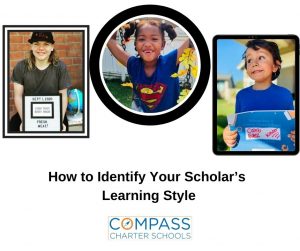
Every scholar learns differently and excels in different subjects. Some scholars may advance in reading or writing, while others may excel in more physical activities. By better understanding your scholar’s learning style, you can help find methods that help your child reach their highest potential.
Learning styles are often categorized into three main groupings: Auditory, Kinesthetic, and Visual. Many scholars use a combination of each but usually have one dominant type. Often scholars will show a balance between all three, but there may be a particular style that allows them to thrive, and learning about their style can help develop successful study methods.
Choosing the appropriate study method makes all the difference when it comes to your child understanding the material. By knowing your scholar’s learning style, you can select effective study methods that complement strengths rather than work against them.
Remember that there is not always one right method. Your scholar may have a mix of skills in all learning style categories. Try different approaches with your scholars and see what works most effectively.
IS YOUR CHILD AN AUDITORY LEARNER?
Auditory learners are usually very musical and drawn to sounds. They may enjoy learning instruments or singing. Often auditory learners are great listeners and have verbal strength. Oral instructions work best for them.
As an infant, was your child drawn to new sounds? Did they notice the sound of the rain when other children were oblivious to it? Does your child better comprehend when they are read to aloud?
Clues that your scholar may be an Auditory Learner:
Does Your Scholar?
- Excel in music, instruments, or vocal ability
- Enjoy having conversations with others
- Listen to all the instructions before beginning and assignment
- Ask a lot of questions when working on projects or activities
- Listen well and follow verbal directions
- Notice sounds that others don’t recognize
- Think in words and verbalizes concepts
- Have an excellent memory for names, dates, and trivia
- Like word games
- Enjoy using tape recorders
- Learn times tables with relative ease.
STUDY TIPS FOR AUDITORY LEARNERS
- Makes up rhymes, songs, or stories when studying
- Talk through areas where your child is struggling
- Get your scholar to dictate a story to you and watch while you write or type it out
- Read aloud together
- Listen to audio lessons or books
- For older children, record information and study materials so they can listen to it back, on their cell phones or tablets.
IS YOUR CHILD A KINESTHETIC LEARNER?
Kinesthetic learners are active, often drawn to dance, sports, or anything physical. They usually have exceptional balance and learn best by completing a task themselves. They are often very animated and may use gestures when talking or explaining things.
Kinesthetic learners may have been very active babies, crawling, and walking early. Many times these physical strengths will stay with them as they grow older.
Clues that your scholar may be a Kinesthetic Learner:
Does Your Scholar?
- Excel at physical activities, such as sports
- Have a difficult time sitting still
- Enjoy hands-on activities
- Thrive in active learning activities like drawing or study games
- Dive right into a task and get started
- Have sharp hand-eye coordination
- Process knowledge through physical sensations
- Communicate using body language and gestures
- Show you rather than tell you
- Want to touch and feel the world around them
STUDY TIPS FOR KINESTHETIC LEARNERS
- Create practice tests to use while studying
- Squeeze a stress ball while studying
- Movement helps kinesthetic learners to focus – allow them to move around every so often while studying
- Allow your scholar to doodle, fiddle with marble, beads, etc. while studying; it can help them concentrate
- Take the class outside, use hands-on activities, take nature walks, scavenger hunts, make learning active
- Avoid things they don’t like – long-range planning, complicated projects, paper and pencil tasks, workbooks
IS YOUR CHILD A VISUAL LEARNER?
Visual learners are drawn to art, nature, and the world around them. They may spend a long time studying paintings, illustrations in books, or photographs. They have a passion for the visual world. They often enjoy computers and televisions, where they can retain the information that they learn there.
These kinds of learners also have vivid memories. They are often exceptionally skilled at remembering names, places, and people. They may have even exhibited these skills from a young age by recognizing the places you’ve returned to together.
Clues that your scholar may be a Visual Learner:
Does Your Scholar?
- Have an interest in art: painting, drawing, or crafts
- Recognize and recall words, locations, and people
- Thrive with visual materials, including maps, graphs, pictures, and illustrations
- Need examples of the projects that they are assigned
- Have a vivid imagination
- Have a strong memory that relays visually-observed information
- Have an interest in observing the world around them
- Learn through seeing images – can remember the pictures on a page
- Show an interest in machines and inventions and how things work
- Like to play with Lego and other construction toys, and complete jigsaw puzzles
- Sometimes daydream in class
STUDY TIPS FOR VISUAL LEARNERS
- Use different colors to create study notes
- Create charts, diagrams, and graphs while studying
- Use memory or board games to create visual patterns
- Allow your scholar to use their imagination when reading together, paint mental pictures, or use visual clues when studying
- Use picture books, even as they get older
- Encourage visualization of a story and reinforce this at intervals
- Encourage writing by using different colors of writing
- Show videos of plays, films, etc. to reinforce the stories they are studying
You have probably noticed the specific strengths of your scholar. If they display a strong affinity for one learning style, you can tailor their study and assignments to support that strength. If they are consistently struggling over time, even after trying all learning types with tasks, you may want to consider looking into a learning disability; so you can support your scholar to excel at home and ensure that accommodations are made in school. At Compass, we are here to support every scholar, each step of the way. Please never hesitate to reach out to your scholar’s counselor or supervising teacher.

Thank you very much for the tips, now I know that my scholar is a Visual Lerning
Wonderful!
I can not thank you enough for this today! This information was exactly what we needed today!
So glad!!
Aprendiz visual
Gracias!
Great information! Thanks for sharing!
Thank you!